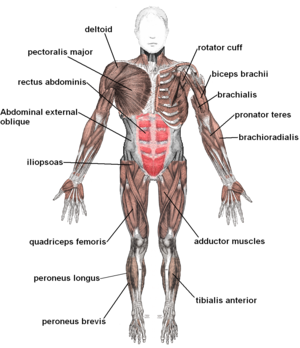
- Image via Wikipedia
Duchenne Muscular Dystrophy is the most common and severe childhood form of muscular dystrophy (MD), affecting one in 3,500 boys.
The disease progressively weakens muscles cells and tissues until muscle degradation is so severe that the patient dies, most often in their late teens or twenties. Scientists at Brown University in Providence, Rhode Island and the University of Pennsylvania, hope their research into the human protein, biglycan, will ultimately improve the condition of muscular dystrophy sufferers. Their studies have shown that biglycan significantly slows muscle damage and improves function in mice with the Duchenne genetic mutation. Human clinical trials will be the next step.
Boys with the genetic mutation causing Duchenne MD (as the gene is on the X chromosome MD mostly affects males; female carriers have milder symptoms) are unable to produce dystrophin, a protein that keeps muscles strong.
Dystrophin is part of a complex protein that connects the cytoskeleton of a muscle fiber to the tissue framework surrounding each cell through the cell membrane. In cases of muscular dystrophy, contraction of the muscle leads to disruption of the outer membrane of the muscle cells and eventual weakening and wasting of the muscle.
The research, published online on 27 December in Proceedings of the National Academy of Sciences, found that biglycan delivered to the bloodstream restores the muscle-strengthening presence of another protein called utrophin. Utrophin is prevalent in very young children and although it still exists to a far lesser degree in adults, it is not available in a way that can benefit those with muscular dystrophy.









